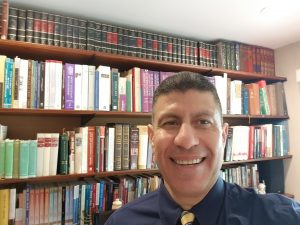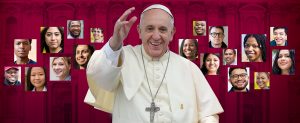
By Jessamyn Anderson Magri
In conversation about the upcoming event, Building Bridges North-South: A Synodal Encounter between Pope Francis and University Students, Dr. Felipe Legarreta emphasizes that the Holy Spirit is at work. He cites the fact that this encounter, and the series of events associated with it, have transcended all expectations; shows evidence of the Holy Spirit challenging us to listen to its voice in the cry of the poor and in the cry of our Common Home, cf. Romans 8:15. This opportunity to listen came about while working with colleagues, Dr. Emilce Cuda, Dr. Peter Jones, Dr. Michael Murphy, and Dr. Miguel Diaz, through a playful suggestion to invite Pope Francis to a synodal dialogue with university students. That suggestion quickly turned into a happy reality. Upon reflection, Dr. Legarreta said the potential for this historic event has been percolating in the background for some time and he feels the Holy Spirit is saying; Listen up! This is the time.
Legaretta cites the groundwork for this event as the publication of the document, Ecclesia in America. This document was published in 1992 under Pope John II, during an assembly of bishops that gathered around the theme, “Encounter with the Living Jesus Christ: The Way to Conversion, Communion and Solidarity in America.” Building on that theme of solidarity established during that assembly, the CELAM (Conference of Latin American Bishops), invited Pope Francis to come to their assembly to discuss these ideas. Pope Francis gently declined; asking the bishops to go back and “listen to the People of God”. Instructing them to find the people on the peripheries, the margins, and listen to their stories, needs and concerns.
This brings us to now and Pope Francis’s second redirect to a leadership team to “listen to the people of God’ and to listen to the people on the margins. Dr. Legarretta explained that the original idea was to invite Francis to dialogue with faculty, staff, and students at Loyola University Chicago. Francis said, yes, I will come, but I want to talk to only students and students from all across the Americas, not faculty. Thus, we land here with the anticipated historic event of university students in direct communication with the Holy See.
In thinking about such a monumental occasion, I asked if the dialogue would be structured or moderated in anyway. Dr. Legarretta said that the only guidepost for students was the topics of migration and economic justice. He, and the team putting the initiative together, want to give students true freedom in asking the questions that are on their hearts. The only limiting factor in the conversation will be time. Each student representing a different region of the Americas will be given about three minutes to ask the questions they have, and then Pope Francis will respond for about five minutes. Again, Dr. Legarretta referenced the Holy Spirit and how this event was so far beyond anyone on the team’s wildest dreams, that the only explanation is the Holy Spirit is at work and we should step out of the way to let that work happen. He framed the dialogue in terms of dialects. The dialect of youth – passion, urgency, and hope, conversing with the dialect of wisdom, as found in the ancient wisdom of the church. There are plans to continue this dialectic dialogue throughout the synodal process with events that give students a platform to raise their voices and be heard.
“To learn more about the Feb. 24 event and to register for the livestream of this historic encounter, visit the event website: Building Bridges: A Synodal Encounter between Pope Francis and University Students.”
